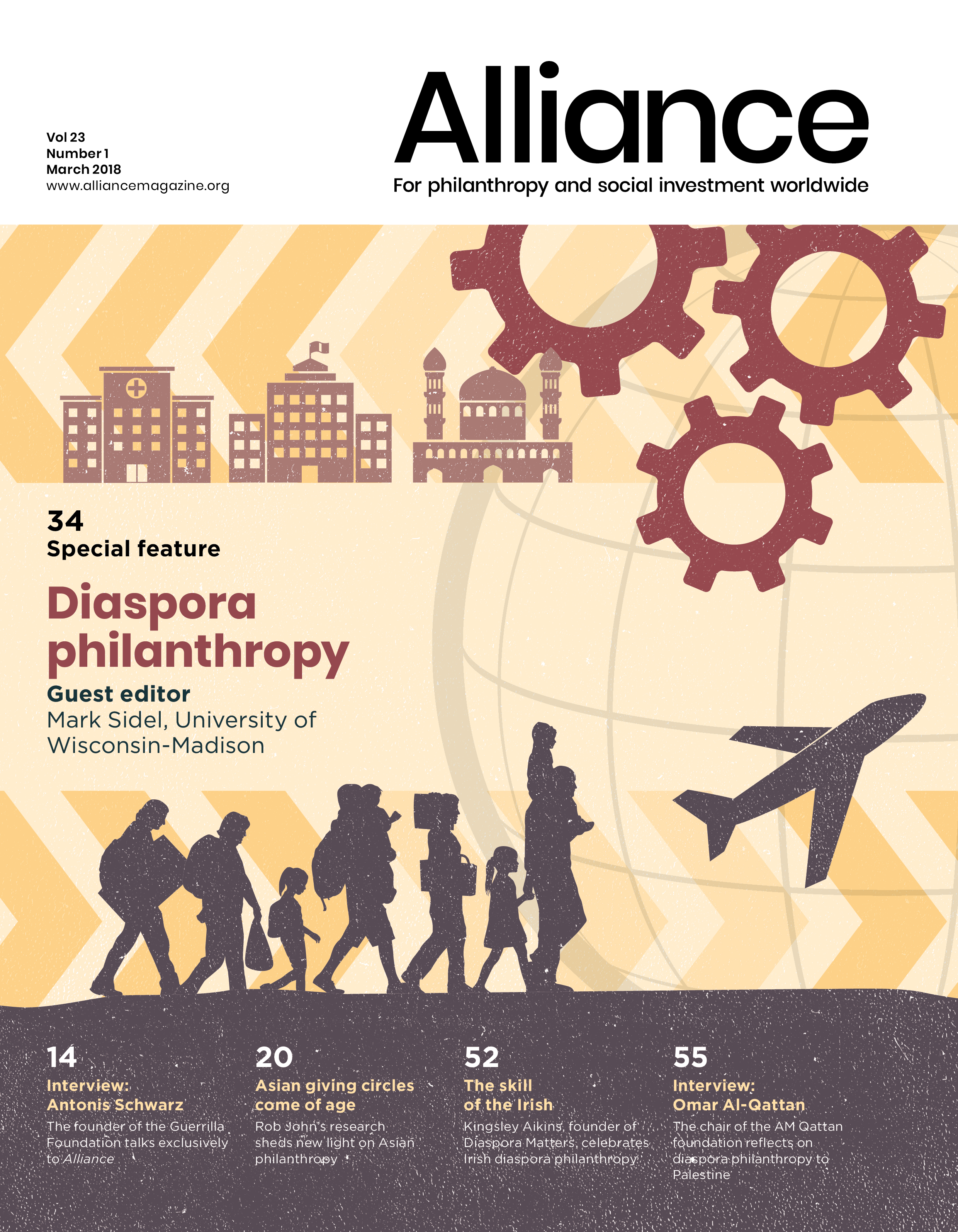Issues that have classically been addressed through public policy – issues such as ocean warming, migration, and the increased pressure on urban areas – are now more global and interconnected in nature.
They require different solutions and actors setting the stage for foundations and high-profile individual donors to take on these challenges.
Like other philanthropists before them, these donors bring their individual perspectives to the work and are guided by their own criteria; but the urgency and the very public nature of these challenges means that the stakes for achieving and showing impact are higher than ever.
Holistic, systems-based approaches
In recent years, our consultancy firm, Rockefeller Philanthropy Advisors (RPA), has partnered with the Skoll Foundation and other funders to facilitate research, learning events and discussions between grantees and donors around the topic of ‘Scaling Solutions’.
This initiative, launched in 2016, points to a clear need for holistic, systems-based approaches that look at the totality of social problems, not just discrete issues to be solved with a specific grant programme.
Moreover, it also recognizes grantees, donors, and communities served as equal partners.
What is driving this shift? ‘Strategic’ philanthropy’s prescriptive and frequently onerous requirements of grantees has not generated desired results.
It has often left non-profits scrambling to satisfy donor requirements for programme-specific dollars that omitted any general operating support.
In addition to stretching the resources of leaner non-profit organizations, it has also meant those non-profits were at risk of ‘mission creep’ to secure additional dollars to keep their work going.
Strategic philanthropy only ‘strategic’ for donors
Hal Harvey, initially a proponent of the grantee-measurement view, wrote a 2016 article called, ‘Why I regret pushing strategic philanthropy’, acknowledging that grantees are often better at strategy than their funders, and that the implication that funders should dictate all strategy was harmful to the field.
His arguments align with our research findings. Both support a collaborative approach to creating intervention strategies.
A key component of achieving long-term, ambitious goals is to help donors to adopt flexible approaches which acknowledge the multifaceted nature of the social and environmental problems they are addressing.
Along with this understanding is an openness to examining the internal processes and assumptions within which funders work. Why are we doing something a particular way? Are we structured to maximize our impact in a field?
To us, a key component of achieving long-term, ambitious goals is to help donors to adopt flexible approaches which acknowledge the multifaceted nature of the social and environmental problems they are addressing.
Five approaches
Based on interviews with dozens of social entrepreneurs and meetings with over 100 donors of different sizes and from different geographic regions, our ‘Scaling Solutions’ work brings five such approaches to the fore: empower, accelerate, learn, collaborate and streamline.
Empower: moving the centre of gravity
An important part of viewing grantees as trusted partners is shifting the power dynamic.
While having money in hand is something which cannot be changed, foundations and donors can make conscious efforts to see themselves as part of an equation rather than the most important ingredient in solving a social problem.
Likewise, allowing communities served through grant programmes to participate decisively in their own development is another way to empower and support inclusive practices.
As an example, the National Social Safety Nets Project (NASSP), a direct benefit transfer programme based in Nigeria, will deliver electronic social payments to the poor through the Ministry of Finance.
These payments, the equivalent of $25 per month, will help to create a social ‘safety net’ in three pilot regions for an estimated one million poor households (10 per cent of the total number estimated to be eligible).
While having money in hand is something which cannot be changed, foundations and donors can make conscious efforts to see themselves as part of an equation rather than the most important ingredient in solving a social problem.
They will do this by providing a minimum, reliable payment to promote consumption, stabilize income flows, address food insecurity and protect against economic shocks. The programme, funded by the Bill and Melinda Gates Foundation, thus empowers recipients to make their own choices in their futures and those of their families.
Nigeria’s government is also introducing other measures which will impact eight million Nigerians in the first year. The government’s approach will make use of the high adoption of cell phone technology (over 60 per cent of the population owns a cell phone) to mitigate the fact that over 40 per cent of citizens are excluded from the formal banking sector.
In the past, a foundation may have shied away from working on such a large scale with a national government but in this case, to achieve the scale desired, government is the perfect partner.
Accelerate and learn: the cause of banking for the financially excluded
Funders can play key roles in accelerating change by supporting research that will create data to be shared by a number of other funders or actors. Sharing data can, in turn, help to build alliances that advance specific goals.
For example, the needs and make-up of those who fall outside the formal financial sector is not well understood across developing countries. Currently, two billion people in the world have no such access and a lack of it has been identified as a key element of inequality globally.
At the same time, there is no standardized way of identifying and understanding the different groups who make up that population.
While in developed economies, market research information helps identify opportunities and accelerate product development, this type of research is not readily available in emerging markets, which slows the pace of innovation and results in digital financial solutions that are supply-side driven.
These products take less account of what low-income people want and in consequence are little used.
The needs and make-up of those who fall outside the formal financial sector is not well understood across developing countries. Currently, two billion people in the world have no such access and a lack of it has been identified as a key element of inequality globally.
Through targeted scans, qualitative and quantitative research, and broad dissemination, the Customer Segmentation Framework project, again funded by the Gates Foundation, aims to help practitioners meet the digital financial service needs of the poor in Kenya, Tanzania, Nigeria, Myanmar and Pakistan by creating a portable and nuanced framework for analysis and action.
It will help the poor in the identified countries to become part of the financial sector, enabling them to create equity, build their businesses, and make choices that are positive for themselves and their families and communities.
An innovative aspect of this work is the fact that the foundation is supporting research that will be provided to for-profit banks, and is usually funded by those banks. In the absence of a partner willing to fund the work, the foundation has stepped in.
Collaborate and streamline: the virtues of a one-stop shop
Both grantees and funders can benefit from a more streamlined approach to grantmaking.
For example, small changes such as grant reporting tied to clusters of milestones, rather than individual milestones, can be helpful.
A streamlined process might also include unrestricted funding, extended grant periods, and the use of a common grant application, rather than one that is different for every funder.
Funders can also simplify the process, and improve their own grantmaking, by collaborating with each other – sharing grantmaking practices, site visit insights, participating in funder collaboratives and coordinating their efforts.
Oceans 5, a coalition of ten international funders who share a commitment to protecting the world’s oceans, was founded in 2011 and focuses on globally significant, collaborative projects to constrain overfishing and establish marine reserves.
Each of the ten funding partners commits to provide at least $3 million over three years, and they have now collectively supported over 30 projects.
The team approach has provided significant benefits to its grantees: rather than negotiating separately with each funder, grantees deal with one organization, for both applications and reporting.
Funders can also simplify the process, and improve their own grantmaking, by collaborating with each other – sharing grantmaking practices, site visit insights, participating in funder collaboratives and coordinating their efforts.
The Oceans 5 collaboration goes well beyond grantmaking to include other key components of success such as sharing strategic advice, in-kind services to grantees, and leveraging matching grants.
It is also committed to sharing intelligence on conservation with other like-minded donors. Not only has this streamlined effort enabled an efficient use of resources, but this coalition of grantees and funders has conducted advocacy towards significant policy and regulatory wins.
For example, in late 2016, it was instrumental in helping to secure the world’s largest marine reserve, of 598,000 square miles, in the Ross Sea of Antarctica.
Press on – but beware of ‘unhelpful help’
Despite progress, data shows our philanthropic community is not yet where we need to be to achieve wide-scale change.
A recent report by Grantmakers for Effective Organisations, Is Grantmaking Getting Smarter?, suggests that, since 2014, foundations have actually been slowing their progress towards sharing power with grantees.
And while there is an increased appetite among some foundations to examine their internal structure and processes, and how those align for success, a significant number do not translate their perceived aptitude for risk into their operations.
Our global philanthropy community needs to find better ways to share success, fund research and use data critical to scaling solutions. We need to be better at understanding our own processes, and exploring how these may help or hinder our partners.
Most of all, we must ensure that the new conversations and efforts at self-examination turn into concrete and measurable actions.
Donzelina Barroso is director of global philanthropy, Rockefeller Philanthropy Advisors.
Email: dbarroso@rockpa.org
Naamah Paley Rose is a philanthropic advisor, Rockefeller Philanthropy Advisors.
Email: nprose@rockpa.org








Comments (0)